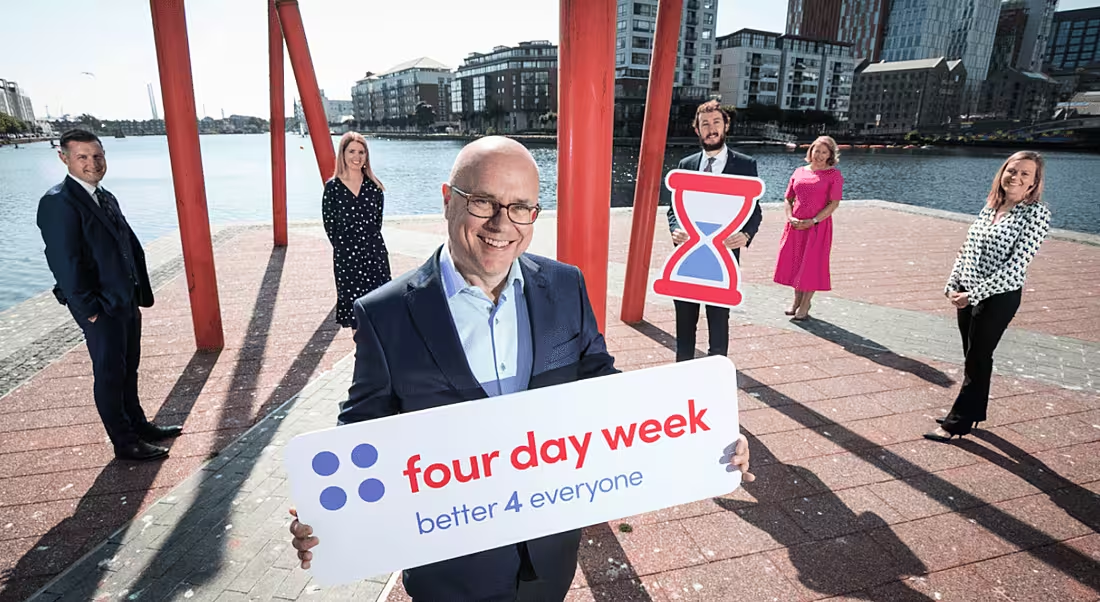Four Day Week Ireland is still looking for companies to participate in its six-month pilot next year.
Campaign group Four Day Week Ireland revealed that 17 companies have signed up to its pilot programme due to commence in 2022.
The pilot, which the group announced in June, will see businesses in Ireland participate in a coordinated six-month trial of a four-day working week, alongside similar pilot schemes in other countries including the US, Iceland, Canada and New Zealand.
Four Day Week Ireland presented its campaign for a reduced working week to the Joint Oireachtas Committee on Enterprise, Trade & Employment this morning (6 October).
Commenting ahead of today’s presentation, Kevin Callinan, general secretary of trade union Fórsa, which is part of the Four Day Week Ireland campaign, said he hoped it would “bolster Government support for our campaign to change working practices for the better for all society.”
“Over the past two years, we have been making the case for a gradual, steady and managed transition to a shorter working week in all sectors of the economy,” he added. “This is an idea whose time has come, and which is growing in international momentum exponentially.”
Other members of the campaign group include the National Women’s Council, Friends of the Earth Ireland, as well as Irish businesses ICE Group, 3D Issue, JMK Solicitors and SCL Sales Ltd, academics and global advocates.
'If you don't start somewhere you won't get anywhere & this is a pilot program' – @Jocser99 speaking at the Joint Committee on Enterprise, Trade & Employment on #4DayWeek this morning #Better4Everyone pic.twitter.com/veWJqODupf
— Four Day Week Ireland (@4DayWeekIreland) October 6, 2021
Companies that participate in the pilot will receive mentoring from organisations and business leaders that have already implemented a four-day week in their workplaces.
The programme is still open for registrations, according to Callinane. “We are looking forward to supporting the employers already signed up on their journey to a four-day week, and we are encouraging those who are considering participating in the trial to get in touch with us,” he said.
“Ireland can be a global leader in delivering reduced-hour working, and developing a culture of world-renowned work-life balance for our people alongside a high-productivity business environment.”
Among the 17 companies due to participate in the pilot programme next year are Dublin-based recruitment services company Yala and bioceuticals manufacturing company Soothing Solutions.
Sinéad Crowther, CEO of Soothing Solutions, said that her company is still a growing business so now is “the perfect opportunity” to try a four-day working week.
“A four-day working week will benefit staff by giving them more time to spend with their families or focusing on their passions, which we strongly believe will in turn result in greater productivity,” she said.
Barry Prost, managing partner of Yala, said that “being able to attract and retain high quality staff” was the company’s main motivation for taking part in the pilot.
“Offering a four-day week will be central to our own recruitment strategy. The success of our business is dependent on the calibre of our staff, and we believe the four-day week will give us an edge when it comes to attracting talent.”
According to a recent workplace equality report carried out by recruitment group Matrix Recruitment, 85pc of Irish workers surveyed are in favour of a four-day working week. Of those, the majority (85pc) said they believed it would boost employee health and wellbeing, while 86pc said it would create a better work-life balance.
More than half (57pc) were of the view that most people could fit five days’ work into four days.
However, of the 15pc not in favour of a four-day working week, 38pc said that it would create a very pressurised environment. More than one-third of respondents said that the policy would result in longer working days.
Almost three-quarters (72pc) of respondents who do not support the idea of a four-day working week said that they did not think it would not be feasible in every industry. One-quarter also said it would be unfair for those already working part-time.
Don’t miss out on the knowledge you need to succeed. Sign up for the Daily Brief, Silicon Republic’s digest of need-to-know sci-tech news.




